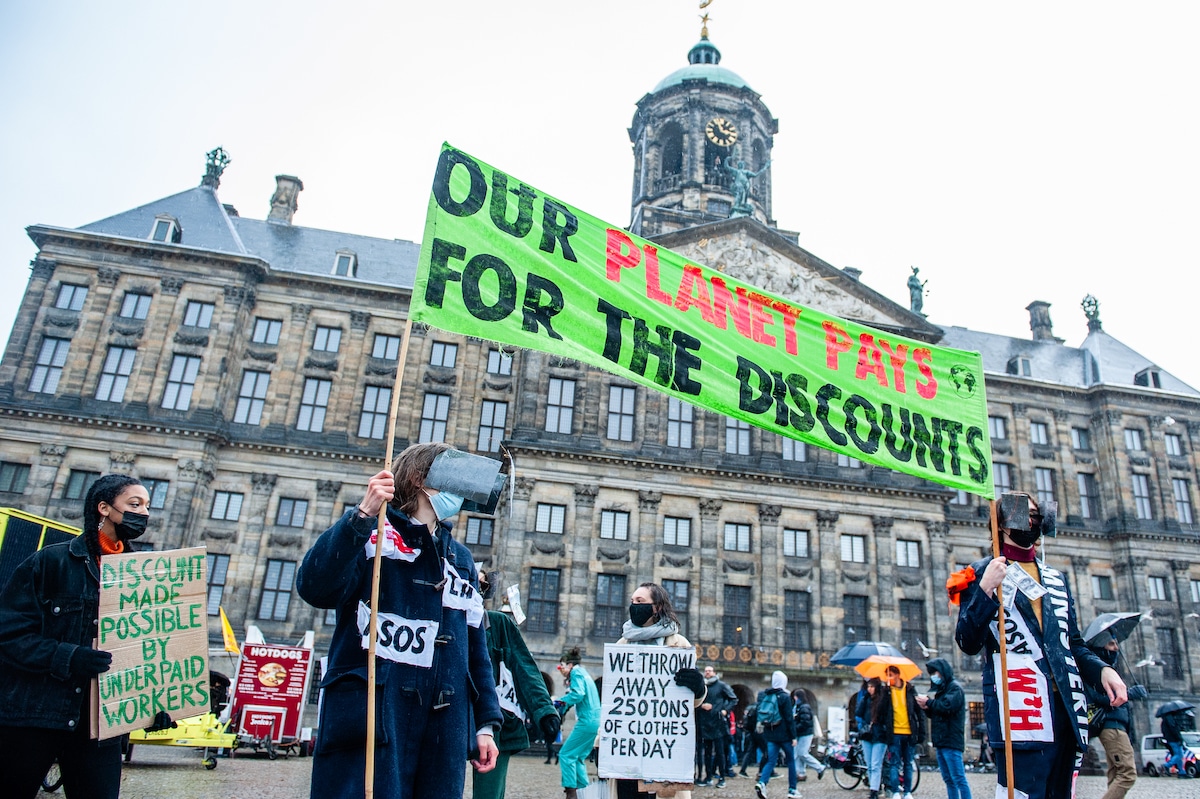

The EU is taking steps to crack down on fast fashion.
The European Commission, the bloc’s executive branch, proposed new rules Wednesday that would set mandatory minimums for recycled textiles by 2030 and other changes geared towards replacing throwaway culture with a circular economy.
“We want sustainable products to become the norm,” commission Vice President Frans Timmermans said, as AP News reported. “The clothes we wear should last longer than three washes.”
The proposal would expand the EU’s eco-design rules, which currently set energy efficiency standards for items like washing machines and toasters, to include new standards for how long a product should last or whether or not it is easy to recycle, The Guardian reported. The commission also wants companies to inform them of how much unused product they send to landfills, and may eventually ban this practice entirely. The new rules would in the future apply to all products, but the commission is starting with textiles.
“The Commission seeks to put a halt on fast fashion by introducing rules on textiles to be used in the European market,” Iona Popescu of nonprofit the Environmental Coalition on Standards told BBC News.
Currently, clothing has the fourth-highest environmental and climate impact in the EU, after food, housing and transport. The bloc has a per capita fashion footprint of nine cubic meters (approximately 318 cubic feet) of water, 400 square meters (approximately 4,306 cubic feet) of land, 391 kilograms (approximately 862 pounds) of raw materials and 270 kilograms (approximately 595 pounds) of greenhouse gas emissions. Because three-quarters of the household textiles and clothes purchased in the EU are imported from abroad, the new rules could have international implications, The Guardian pointed out. Worldwide, less than one percent of all clothing is ever recycled, according to BBC News.
The European Commission rules also propose new rights for consumers. These include the right to know how long a product will last and how or whether it can be repaired. Further, the commission seeks to prohibit companies from greenwashing or otherwise making misleading claims about the sustainability of their products.
No more greenwashing, planned early obsolescence or misleading practices.
— European Commission 🇪🇺 (@EU_Commission) March 30, 2022
Today, we are proposing to empower consumers to make informed and environment-friendly choices when buying products.
To achieve our #EUGreenDeal goals, we have to start consuming more sustainably.
“We are supporting consumers who increasingly want to choose products that last longer and can be repaired,” European Commission Vice-President for Values and Transparency Věra Jourová said in a statement. “We must ensure that their commitment is not hampered by misleading information. We are giving them strong new tools to make informed choices and increase sustainability of the products and our economy with this proposal.”
Unfair commercial practices that prevent sustainable purchases and mislead consumers will end.
— European Commission 🇪🇺 (@EU_Commission) March 30, 2022
The new rules will ensure, among others:
✅ Trusted information on product sustainability
✅ Transparency on early obsolescence
✅ A verified sustainability label
#EUGreenDeal pic.twitter.com/rzFwhTjOCP
The new rules are part of the EU’s goal of being carbon neutral by 2050 and will next be discussed by the Council and European Parliament.
The proposal also puts pressure on the fashion industry to change.
Changing Markets Foundation NGO Director Nusa Urbancic told The Guardian that the proposals were a good way to introduce the sector to the “polluter pays principle.”
“High street brands dazzle us with vast amounts of cheap clothes that aren’t designed to last for long, but they don’t pay for the mountains of waste that get dumped, including in developing countries. That is wrong and will likely now change, following today’s announcement,” she said.
Timmermans also said that a “cultural change” was already underway in the world of luxury fashion.
“The designers, the artists – they realize that the world has changed and that we need to revisit the way we design fashion,” he said, as AP News reported.

 233k
233k  41k
41k  Subscribe
Subscribe 